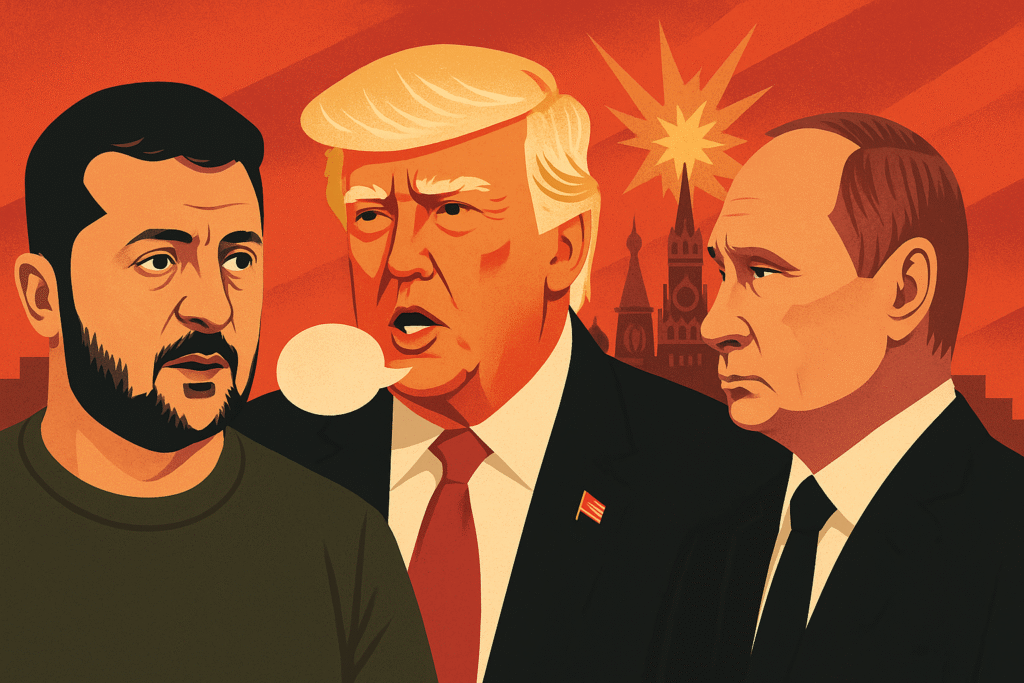Former U.S. President Donald Trump reportedly asked Ukrainian President Volodymyr Zelenskyy whether Ukraine could launch strikes on Moscow and St. Petersburg if given long-range weapons, according to individuals briefed on their recent July 4 phone call. The conversation, confirmed by multiple sources familiar with U.S.-Ukraine discussions, marks a notable shift in Trump’s public position on Russia’s war and military engagement abroad.
The call took place one day after Trump held a separate conversation with Russian President Vladimir Putin, which Trump later described as “bad.” Frustrated by the lack of progress in ceasefire talks, Trump reportedly told Zelenskyy that escalating pressure on Russia through direct strikes could force Moscow to negotiate.
“Volodymyr, can you hit Moscow? Can you hit St. Petersburg too?” Trump asked, according to the sources. Zelenskyy responded affirmatively:
“Absolutely. We can if you give us the weapons.”
Trump expressed support for the idea, reportedly stating the strategy would “make them [the Russians] feel the pain” and push the Kremlin to the negotiating table.
U.S. Weighs Expanded Weapons Transfers to Ukraine
Following the Trump-Zelenskyy call, U.S. defense officials provided a list of potential long-range weapon systems to the Ukrainian delegation during a meeting in Rome. The weapons could be transferred to Ukraine through third-party European allies, bypassing the need for Congressional approval for direct military aid.
Among the systems discussed were Tomahawk missiles, which have a range of up to 1,600 kilometers, and ATACMS (Army Tactical Missile System), which the U.S. has already supplied to Ukraine in limited quantities. However, ATACMS missiles, with a maximum range of 300 kilometers (186 miles), are not capable of reaching Moscow from current Ukrainian positions.
While Ukraine has used ATACMS to strike Russian targets — including within Russian sovereign territory — there have been longstanding concerns in both the Trump and Biden administrations over Kyiv’s potential lack of targeting restraint.
Russia Warns of Retaliation, Updates Nuclear Doctrine
Russia has consistently warned against Western involvement in long-range strikes against its territory. After Ukraine first used ATACMS to hit Russian military sites in November, Putin responded by test-firing a new intermediate-range missile and unveiled a revised nuclear doctrine, lowering the threshold for the use of nuclear weapons.
The updated doctrine appears to allow for first-strike nuclear options against NATO nuclear powers — the U.S., UK, and France — if Ukrainian strikes on Russian territory are perceived as being carried out with Western-supplied arms.
Putin warned that Russia reserves the right to retaliate against military facilities in any country that enables Ukrainian attacks, and emphasized that any future escalation would be met with “decisive and symmetrical” responses.
Ukraine’s Independent Long-Range Operations Continue
Despite constraints from Western partners, Ukraine has developed its own deep-strike capabilities. In early June, Ukraine’s SBU intelligence agency launched Operation Spiderweb, using suicide drones hidden in prefabricated houses smuggled into Russia to attack strategic bomber fleets. The strikes reportedly destroyed or heavily damaged at least 12 aircraft used in Russian bombing campaigns against Ukrainian cities.
What Comes Next
While neither the White House nor Ukraine’s Presidential Office have commented on the July 4 call, the report reflects shifting dynamics in U.S. policy toward Ukraine under Trump. Though the U.S. has publicly maintained limits on how far Ukrainian strikes can go, sources indicate that such restraints are loosening, amid growing frustration with Russia’s intransigence and a desire among some Western officials to bring the war closer to Moscow.
During a recent Oval Office meeting with NATO Secretary-General Mark Rutte, Trump reaffirmed a commitment to supply Patriot air defense systems to Ukraine, though he made no mention of offensive weaponry.
Trump also criticized Putin directly, stating,
“I’m disappointed in President Putin, because I thought we would have had a deal two months ago.”
In response, Dmitry Medvedev, Deputy Chair of Russia’s Security Council, dismissed Trump’s remarks as theatrical and irrelevant to Russian strategy.
Conclusion
The revelations about Trump’s private discussions with Zelenskyy signal a potential pivot in U.S. support for long-range Ukrainian strikes, introducing new variables into the war’s trajectory. As Ukraine seeks more advanced systems and the U.S. contemplates third-party transfer mechanisms, escalation risks — both conventional and nuclear — are on the rise.



